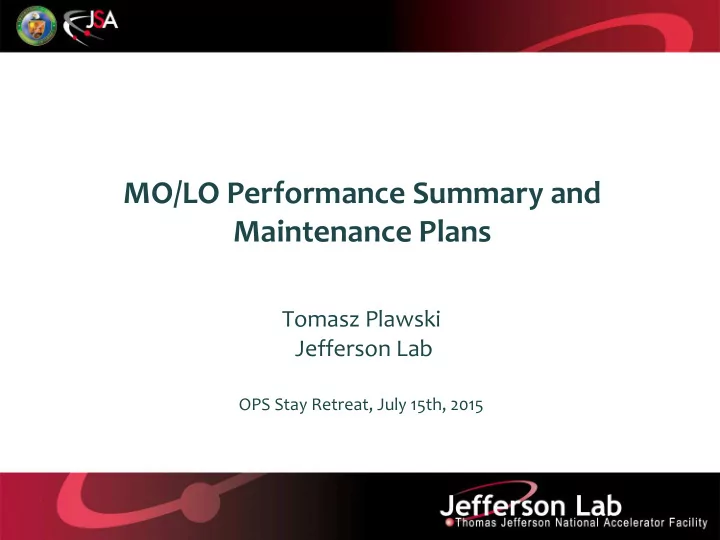

MO/LO Performance Summary and Maintenance Plans Tomasz Plawski Jefferson Lab OPS Stay Retreat, July 15th, 2015
Outline • MO System Description • Performance Phase Jitter – Energy Spread Phase Drift – Beam Energy Amplitude Stability – Beam Energy/ Gradient Calibration • Monitoring and Maintenance • Future Plans
MO System Description
Performance Why MO performance is important ? Master/Local oscillators used for two purposes: • down/up-conversions • clock synthesis for ADC and DAC in digital LLRF systems or phase reference in analog LLRF ones are the largest contributors of uncorrectable inaccuracies of cavity accelerating field !
Performance – Phase Noise LLRF stability requirements: Correlated Uncorrelated 2.2 x 10 -5 4.5 x 10 -4 Amplitude RMS error Phase RMS error 0.25 ° 0.5 ° 499 MHz LO / R&S +B22 option 10/70 MHz MO / Wenzel Associates, Inc. 340 fs (shown) will cause 180 mdeg of phase and CDCM7005 based system for DLLRF noise on 1427 MHz LO signal Slight Concern: Slight Concern: PM modulation used for Beam-Based FM modulation used for path control (CEBAF Phase Stabilization, rises phase noise circumference can change significantly) rises by about 70 mdeg phase noise up to 230 mdeg
Performance – Phase Drift Drift Mitigation • Linac, Injector LO and MO lines temperature stabilization • Precision Beam-Based RF Phase Stabilization • Hall D Phase Drift Monitor ( New optical fiber based RF distribution system) • Service Building Temperature Control • Careful Selection of RF Cables Weakness Phase drift between Injector and NL uncontrolled Phase drift between MCC and W1/W2 uncontrolled Possible improvements • Phase feedback between MCC and local MO chassis • Well-known good solution, Phase Averaging Line, is not practical for CEBAF
Performance – Amplitude Stability The concern is amplitude stability of LO signal used for RF signals heterodyning in LLRF systems Typically for C100 - DLLRF Systems: 1 % of LO amplitude variation will cause 0.25 % of cavity gradient variation ! May 2015 NL LO events Problem has been fixed by increasing 499 MHz signal level before frequency trippler rather than adjusting 1427 MHz drive signal level Why it happened ? We have different “flavor” of 1427 MHz synthesizer while drive level was set identically level repair adjustment 18 % of LO level drop Future mitigation: • Documentation updates • Diagnostic/ repair plans
Performance – Amplitude Stability LO Amplifier Specification LO level [mV] LCW temperature Max. cooling water temperature for 500 W Bruker amplifier is 35 ° C ( 95 ° F) ! We learned it by experiencing the consequences. Impending plans: • LCW 19” Rack Mount Water Chiller ( temp. stability ± 0.1 ° C) - 4 local MO racks
Performance – Amplitude Stability Amplitude Stability LO level [mV] LCW temperature Recent LO level ( LOPW) stability is 0.5% thus gradient measurement may vary by 0.13% Installation of LCW chiller may reduce this number down to 0.01% . At this accuracy contribution of other RF system components will overcome this value. Considered option : LO Amplifier Automatic Gain Control Pros: keep amplitude stable Cons: could and will cause phase shift
What else can be done ? • Increase LO signal level by 1 dB ( from 250 W to 320 W) for better LLRF mixer “saturation” in order to reduce modulation index ( currently .25) Pros: Reduction of modulation index from .25 down to ~ .15 Cons: All LLRF system will required re-calibration
Monitoring and Maintenance • Every LLRF system contains LO and MO power detector and these signals are archived • LO lines temperatures are controlled and monitored • Since phase measurement is relative we can’t monitor LO/MO phases unless feedback loop will be added ( Hall D case) • MO diagnostic chassis + software provide some level of diagnostic for MCC located MO system • Most critical spare parts are stored and occasionally tested
Future Plans • LCW 19” Rack Mount Water Chiller ( temp. stability ± 0.1 ° C) - 4 local MO racks • Remove obsolete EIPCS Screens
Thank you for your attention ! Special thank to Larry Farrish and Clyde Mounts for continued support of MO operation.
Backup Slides
LO Line Coupler
RF cable LFC78-50J-TC Expected Phase drift:
Hall D MO System
Recommend
More recommend